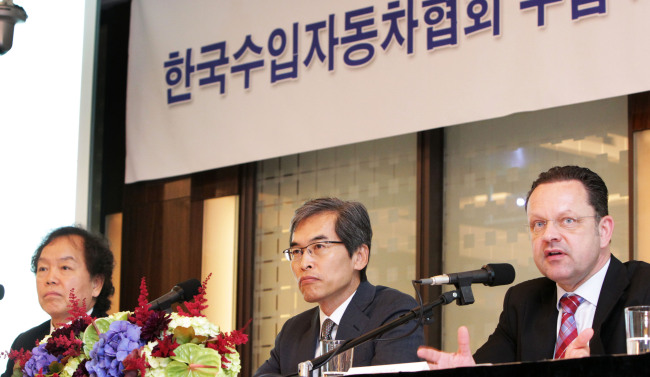Foreign carmakers pledge to fulfill social responsibility
The nation’s import car industry, which is continuously expanding, will grow by 40 percent over the next two years, the Korea Automobile Importers & Distributors Association said on Tuesday.
At a news conference in Seoul to celebrate the 25th anniversary of Korea opening its automotive market to foreign players, KAIDA leaders predicted that sales of import vehicles will reach 140,000 units by 2014, from the current level of 100,000 units per year.
Korea saw yearly sales of import cars surpass 100,000 units in 2011 for the first time. Their 2011 sales came to 105,037 units, up 16 percent from 90,562 units a year before.
This year, the association forecasts the 25 import brands together will grab 10 percent of the nation’s automobile market in terms of yearly sales for the first time in history.
On a monthly basis, the import car industry has already attained a milestone 10 percent market share.
Apart from the big four ― BMW, Mercedes-Benz, Audi and Volkswagen ― new competitive players such as Nissan and Jaguar/Land Rover have been fueling the rapid sales growth in Korea.
During the press conference, KAIDA chief Jung Jae-hee said the industry “would push ahead with programs, including philanthropic activities, for corporate social responsibility” in the coming years.
The nation’s import car industry, which is continuously expanding, will grow by 40 percent over the next two years, the Korea Automobile Importers & Distributors Association said on Tuesday.
At a news conference in Seoul to celebrate the 25th anniversary of Korea opening its automotive market to foreign players, KAIDA leaders predicted that sales of import vehicles will reach 140,000 units by 2014, from the current level of 100,000 units per year.
Korea saw yearly sales of import cars surpass 100,000 units in 2011 for the first time. Their 2011 sales came to 105,037 units, up 16 percent from 90,562 units a year before.
This year, the association forecasts the 25 import brands together will grab 10 percent of the nation’s automobile market in terms of yearly sales for the first time in history.
On a monthly basis, the import car industry has already attained a milestone 10 percent market share.
Apart from the big four ― BMW, Mercedes-Benz, Audi and Volkswagen ― new competitive players such as Nissan and Jaguar/Land Rover have been fueling the rapid sales growth in Korea.
During the press conference, KAIDA chief Jung Jae-hee said the industry “would push ahead with programs, including philanthropic activities, for corporate social responsibility” in the coming years.

He also vowed to enhance quality-based growth, turning from the past position of seeking mere sales growth.
Foreign carmakers saw the market share exceed 1 percent for the first time in 2002.
Buoyed by active sales of smaller-sized sedans in the early 2000s, import vehicles’ combined market share continued to climb to 5 percent in 2007.
European carmakers have been enjoying further sales growth since the implementation of the Korea-EU Free Trade Agreement on July 1, 2011.
Dealers attribute their sales growth to lower vehicle prices as tariffs on import vehicles were lowered under the FTA.
The import car industry saw its vehicle sales reach an all-time high during the first half of the year, posting a monthly average of more than 10,373 units.
Their sales came to 62,239 units in the first half, up 20.5 percent over the same period last year, KAIDA said.
For sales in June, import car brands reported an 18 percent year-on-year growth with sales of 10,578 units, though they inched down from May.
It was the fourth month in a row that sales surpassed 10,000 units, according to the association.
While KAIDA officials expect monthly sales of more than 10,000 units to continue in the coming months, they said the eurozone fiscal crisis was an unpredictable factor.
BMW topped the list by selling 14,512 units in the first six months of the year, posting a 19.6 percent on-year growth, followed by Mercedes-Benz with 9,807 units, Volkswagen with 7,754 units and Audi with 7,279 units.
Markedly, Audi, a unit of Volkswagen Group, saw its sales in Korea jump 50.2 percent from the previous year.
BMW 520d was the best-selling model with first-half sales of 4,466 units, followed by Toyota Motor’s Camry with 2,853 units, Mercedes-Benz E300 with 2,487 units, BMW 320d with 2,207 units and BMW528 with 1,929 units.
KAIDA data showed, in particular, that sales of cars with an engine displacement of less than 2.0 liters increased to 48 percent of total sales, from 41.9 percent in the first half of 2011.
By Kim Yon-se (kys@heraldcorp.com)









![[Kim Seong-kon] Democracy and the future of South Korea](http://res.heraldm.com/phpwas/restmb_idxmake.php?idx=644&simg=/content/image/2024/04/16/20240416050802_0.jpg&u=)







![[KH Explains] Hyundai's full hybrid edge to pay off amid slow transition to pure EVs](http://res.heraldm.com/phpwas/restmb_idxmake.php?idx=652&simg=/content/image/2024/04/18/20240418050645_0.jpg&u=20240418181020)

![[Today’s K-pop] Zico drops snippet of collaboration with Jennie](http://res.heraldm.com/phpwas/restmb_idxmake.php?idx=642&simg=/content/image/2024/04/18/20240418050702_0.jpg&u=)